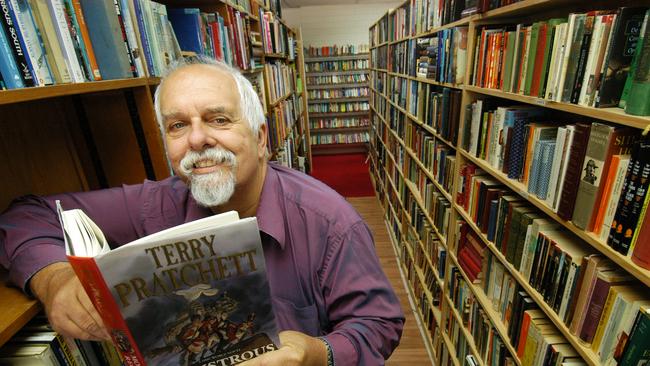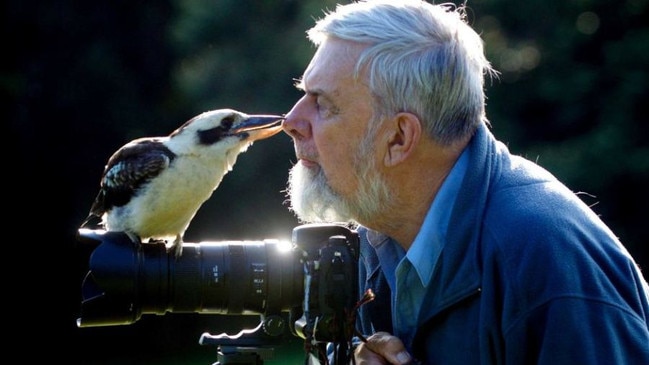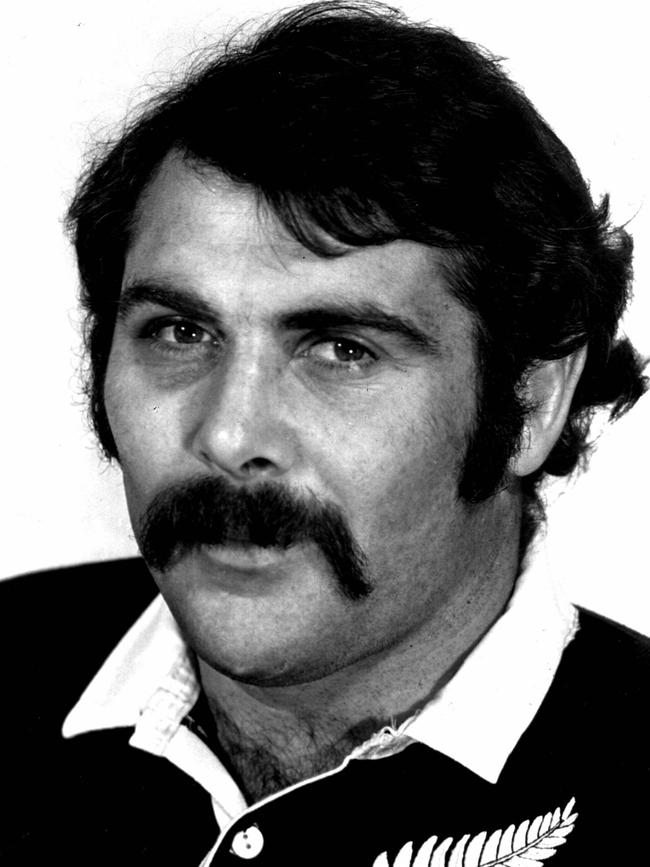Obituaries for April 14, 2018; David Christophel, Martin Jacka, Keith Murdoch
Today we pay tribute to a botanist who sold second hand books, a press photographer who loved nature, and the wild man of New Zealand rugby who “went bush” in Australia.

Opinion
Don't miss out on the headlines from Opinion. Followed categories will be added to My News.
READER CONTRIBUTIONS: Do you want to honour someone? Contact Tim Lloyd, Obituaries, The Advertiser, GPO Box 339, Adelaide, 5001. Ph: 8206 2279. Email obituaries@theadvertiser.com.au
Today we pay tribute to a botanist who sold second hand books, a press photographer who loved nature, and the wild man of New Zealand rugby who “went bush” in Australia.
DAVID CHARLES CHRISTOPHEL
Paleobotanist, book shop owner
Born: August 27, 1947; Oelwein, Iowa, US
Died: January 20, 2018; Blackwood
Education: Oelwein High, Coe College, University of Alberta
Achievements: Establishing SA’s biggest second-hand book store; rainforest fossil research
Family: Survived by Debbie, children Angie, Al and Gemma, grandfather of Scarlett
AFTER an extended academic career as a paleobotanist, David Christophel turned his full attention to running a bookshop in Blackwood, winning the hearts of the community there.
He grew up in the United States in a small mid-West town famed for its pigs, corn and oats, the only child of Phedona and Orville, who ran a local general store.
Orville taught young David some of the rudiments of retail hospitality that he would later put to good use.
Orville was a Presbyterian lay preacher, and David would follow suit in Adelaide.
He was dux of Coe College in Cedar Rapids in 1965, majoring in drama and biology.
He met Annabel Worthley from Adelaide when she was in the US as an American Field Scholar. He sold his Chevrolet to pay the fare to Adelaide to propose and they married here in 1968.
They returned to North America so David could complete his doctorate at the University of Alberta, in philosophy, though his post-graduate work at Alberta was in botany and biology.
In 1973, he became lecturer in botany and biology at the University of Adelaide. He spent years developing the key for fossil rainforest species in Far North Queensland.
A similar study he joined in Anglesea in Victoria collected rainforest fossil specimens and showed that a tropical rainforest had once grown across the southeast of Australia.
His training in drama had a lot to do with his success as a lecturer and at the University of Adelaide he won the Steven Cole Excellence in Teaching award in 1996.
That might have had something to do with his propensity to dress up as a tree or a flower ovary in order to keep his students captivated.
In 2002 he won his first full tenured professorship, at the University of Denver, where he was also the inaugural director of the Denver University arboretum.
He had met his second wife, Debbie, in 1990, and they had a child in 1993.
They shared a love of books and literature and in 1997 they bought Blackwood Books and established it as the Blackwood Book Exchange. David loved running the bookstore and made it an important stopping-in place for the locals.
He became a force in the Totally Locally Blackwood Business Association, and was generally known as “the American” by the locals.
The bookshop, which had been bought with 5000 books in stock, eventually moved so that it could squeeze in 50,000 volumes. Whenever anyone asked a question about a book, David’s disembodied booming voice would provide the answer from somewhere behind a pile of books.
Every so often the visitor would not be looking for books, but for the paleobotanist, wishing to discuss some of the implications of his work on rainforest fossils.
He exercised a “300 rule”, where people wanting to trade their books would have to bring them to the store if they had less than 300, while he would visit in those cases were there were more than 300 books on offer.
From its unlikely site in the Blackwood Plaza, the exchange emerged to be regarded as the largest and one of the best second-hand book shops in the state, credited with introducing readers to new authors and new ideas regardless of their age or knowledge of literature.
When he took the Denver University professorship in 2002, David and Debbie sold the bookshop — before returning in retirement in 2007 to take it up once again.
David found time for his many interests, as a lay preacher, a chorister, Father Christmas with authentic beard and belly, an accomplished poet, sportsman, and with pets ranging from dogs to fish.
Of course he was an avid book reader.
David’s family is yet to decide what future course is open for the book exchange.
MARTIN JACKA
Photographer
Born: March 11, 1943; Newquay, Cornwall, UK
Died: January 14, 2018; Lismore, New South Wales

PRESS photographers and nature photographers can be two entirely different breeds, but Martin Jacka found deep pleasure in both pursuits.
He was born to Gwen and Tom and traced his fascination for photography to his first job, as a police cadet in England.
He was shown highly detailed photographs of a murder weapon, a blood-stained carving knife, revealing fingerprints and scratches. He decided that photography was something he would like to do.
He studied art and photography at arts school in London and after two years won his first booking as a photographer, on a cruise ship, spending four months touring the world. Newly married to Gillian and living in a caravan in Newquay with his small family, Martin decided in 1970 that it was time to take the 10 pound trip to Australia and settle here.
He would spend most of the rest of his life in Adelaide, his parents following suit.
He started as a welder at Holden before his first job in photography in department store John Martins’s advertising department after going to the wrong office while applying for a job to sell photographic equipment.
Later he worked for Messenger Press in Elizabeth, and then took the family to Rockhampton in Queensland after being appointed the picture editor for the Morning Bulletin.
He came back to Adelaide for further study at the University of Adelaide until he was hired by The Advertiser.
The Jackas settled in Semaphore and Martin worked through the turbulent period when the morning daily was taken over by News Corporation. He spent time as pictorial editor and in 1994 took one of the photographs that would define his career.
Keen on sports photography, he was at the Gawler races in his own time when he snapped a jockey in mid-fall from his horse, appearing to be sprinting for the finish. It was used around the world, and won the nation’s top prize for photography in the Walkley Awards.
Later, his other passion, for nature photography, saw him snap a horse, a dog and a dolphin, all swimming together in the Port River.
It too was published around the world, inspired a film, and raised the cause of the pod of dolphins in the polluted and busy river for national debate.
In retirement, Martin dedicated his life to taking beautiful, sometimes quirky, photographs of the nature around him, particularly once he moved to rural Dunoon near Lismore in northern NSW.
He is survived by children Lisa and Martyn and four grandchildren.
KEITH MURDOCH
“Wild man” of rugby
Born: September 9, 1943;
Dunedin, New Zealand
Died: March 30, 2018, place
unknown, Australia

KEITH Murdoch was the New Zealand rugby player who “went bush” in Australia in controversial circumstances during an All Blacks European tour.
Barrel-chested and weighing in at 112kg, he had a reputation for ferocious play while still in the Otago team at the cold end of New Zealand’s South Island.
He was a prop forward whose reputation preceded him for the All Blacks 1972 tour in Britain. They beat Wales 19-16 with Keith scoring the only try and being exalted as the match winner.
He celebrated with team mates at his Cardiff hotel and in the early morning went in search of more to drink. He was challenged by a security guard, who suffered a black eye in the resulting dust-up.
In the ensuing media brouhaha, All Blacks’ tour manager Ernie Todd decided to send Keith home. It seemed an over-reaction for a bar-room brawl, particularly in that era of wild men of cricket and rugby, and Keith obviously took it to heart.
He got off his flight in Singapore and switched to one for Darwin. Then he disappeared into the Great Australian Outback.
The media went in search of Keith but the best they could do were unconfirmed reports of him working on stations and drill rigs. The unspoken bond of mateship and men’s business meant he could become both invisible and legendary in his own lifetime.
New Zealand rugby writer Terry McLean found him at a drilling site in Western Australia in the late 1970s and was told to go away in such a manner he left immediately. There would be three further confirmed sightings of Keith in Australia and New Zealand.
The last was in 2001, when Keith was called as a witness after the death of Christopher Kumanjai Limerick at Tennant Creek, reportedly last seen at Keith’s share house.
Only on March 31 did Keith’s family contact the All Blacks to advise them of his death, the exact circumstances of which were not clear.


